University Name - SPO102: Marketing Implications of Match Fixing
VerifiedAdded on 2023/01/16
|6
|1685
|97
Report
AI Summary
This report examines the significant marketing implications of match fixing within sports organizations. It begins with an introduction that defines match fixing and highlights its growing prominence, along with a background of the major match fixing incidents in various sports. The report then establishes a clear stance on the issue, emphasizing that the problem goes beyond individual players and extends to organizational loopholes. It discusses the ethical and critical perspectives of match fixing, emphasizing the challenges posed by technology and the financial vulnerabilities of athletes. The report further explores the impact of match fixing on marketing activities, particularly in the digital age, where scandals spread rapidly. The report concludes by offering an ethical framework for preventing unethical activities in sports.
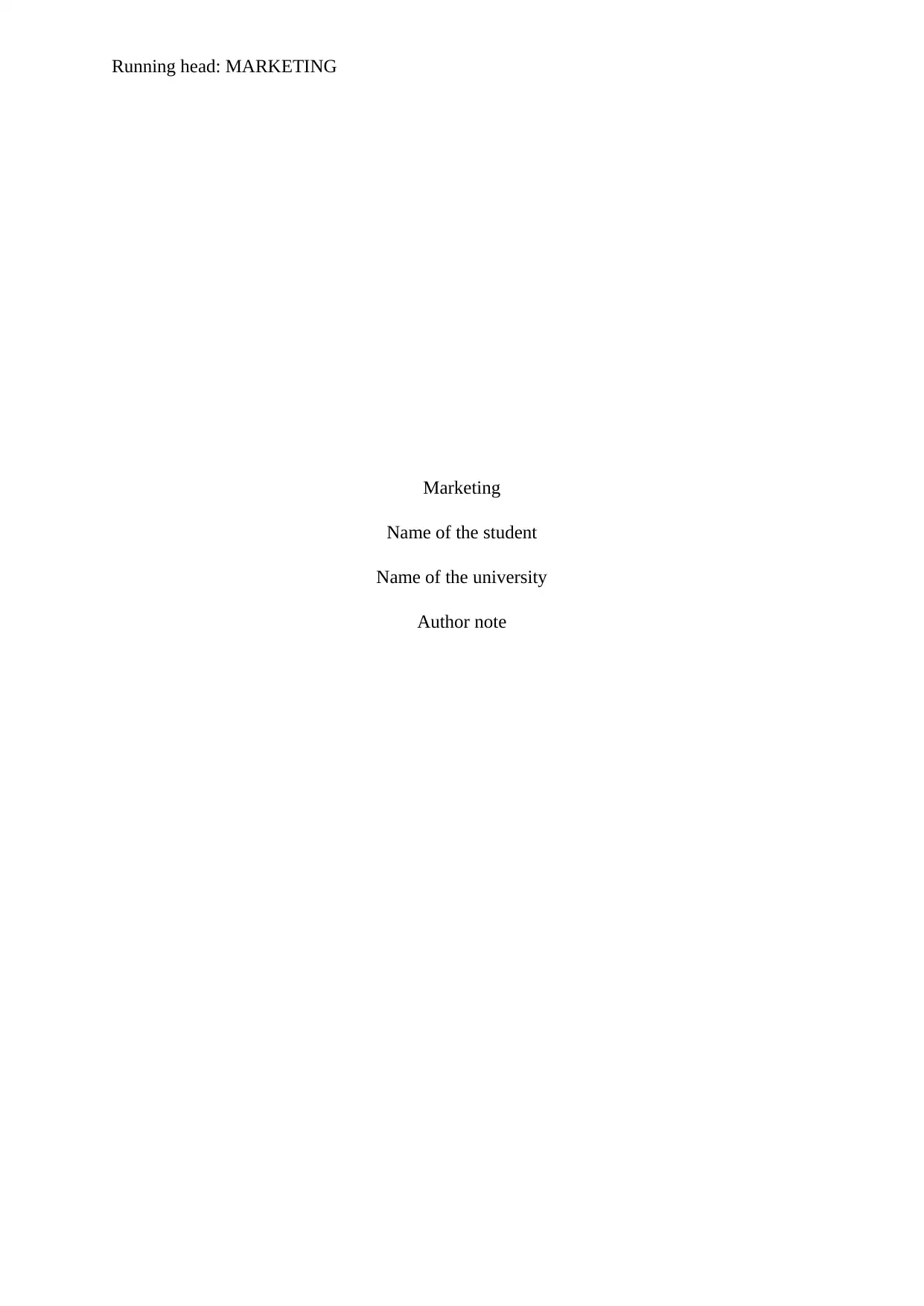
Running head: MARKETING
Marketing
Name of the student
Name of the university
Author note
Marketing
Name of the student
Name of the university
Author note
Paraphrase This Document
Need a fresh take? Get an instant paraphrase of this document with our AI Paraphraser
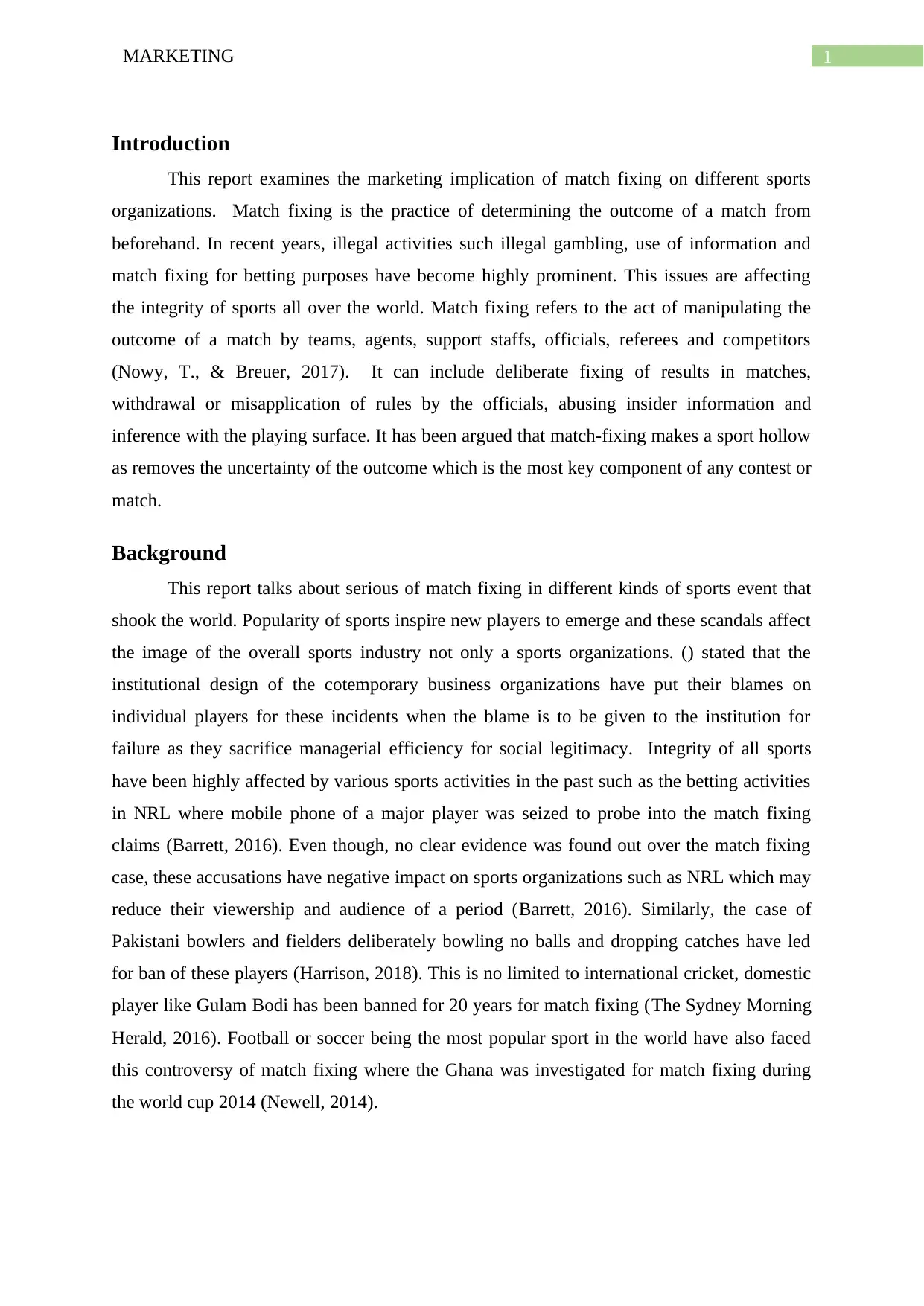
1MARKETING
Introduction
This report examines the marketing implication of match fixing on different sports
organizations. Match fixing is the practice of determining the outcome of a match from
beforehand. In recent years, illegal activities such illegal gambling, use of information and
match fixing for betting purposes have become highly prominent. This issues are affecting
the integrity of sports all over the world. Match fixing refers to the act of manipulating the
outcome of a match by teams, agents, support staffs, officials, referees and competitors
(Nowy, T., & Breuer, 2017). It can include deliberate fixing of results in matches,
withdrawal or misapplication of rules by the officials, abusing insider information and
inference with the playing surface. It has been argued that match-fixing makes a sport hollow
as removes the uncertainty of the outcome which is the most key component of any contest or
match.
Background
This report talks about serious of match fixing in different kinds of sports event that
shook the world. Popularity of sports inspire new players to emerge and these scandals affect
the image of the overall sports industry not only a sports organizations. () stated that the
institutional design of the cotemporary business organizations have put their blames on
individual players for these incidents when the blame is to be given to the institution for
failure as they sacrifice managerial efficiency for social legitimacy. Integrity of all sports
have been highly affected by various sports activities in the past such as the betting activities
in NRL where mobile phone of a major player was seized to probe into the match fixing
claims (Barrett, 2016). Even though, no clear evidence was found out over the match fixing
case, these accusations have negative impact on sports organizations such as NRL which may
reduce their viewership and audience of a period (Barrett, 2016). Similarly, the case of
Pakistani bowlers and fielders deliberately bowling no balls and dropping catches have led
for ban of these players (Harrison, 2018). This is no limited to international cricket, domestic
player like Gulam Bodi has been banned for 20 years for match fixing (The Sydney Morning
Herald, 2016). Football or soccer being the most popular sport in the world have also faced
this controversy of match fixing where the Ghana was investigated for match fixing during
the world cup 2014 (Newell, 2014).
Introduction
This report examines the marketing implication of match fixing on different sports
organizations. Match fixing is the practice of determining the outcome of a match from
beforehand. In recent years, illegal activities such illegal gambling, use of information and
match fixing for betting purposes have become highly prominent. This issues are affecting
the integrity of sports all over the world. Match fixing refers to the act of manipulating the
outcome of a match by teams, agents, support staffs, officials, referees and competitors
(Nowy, T., & Breuer, 2017). It can include deliberate fixing of results in matches,
withdrawal or misapplication of rules by the officials, abusing insider information and
inference with the playing surface. It has been argued that match-fixing makes a sport hollow
as removes the uncertainty of the outcome which is the most key component of any contest or
match.
Background
This report talks about serious of match fixing in different kinds of sports event that
shook the world. Popularity of sports inspire new players to emerge and these scandals affect
the image of the overall sports industry not only a sports organizations. () stated that the
institutional design of the cotemporary business organizations have put their blames on
individual players for these incidents when the blame is to be given to the institution for
failure as they sacrifice managerial efficiency for social legitimacy. Integrity of all sports
have been highly affected by various sports activities in the past such as the betting activities
in NRL where mobile phone of a major player was seized to probe into the match fixing
claims (Barrett, 2016). Even though, no clear evidence was found out over the match fixing
case, these accusations have negative impact on sports organizations such as NRL which may
reduce their viewership and audience of a period (Barrett, 2016). Similarly, the case of
Pakistani bowlers and fielders deliberately bowling no balls and dropping catches have led
for ban of these players (Harrison, 2018). This is no limited to international cricket, domestic
player like Gulam Bodi has been banned for 20 years for match fixing (The Sydney Morning
Herald, 2016). Football or soccer being the most popular sport in the world have also faced
this controversy of match fixing where the Ghana was investigated for match fixing during
the world cup 2014 (Newell, 2014).
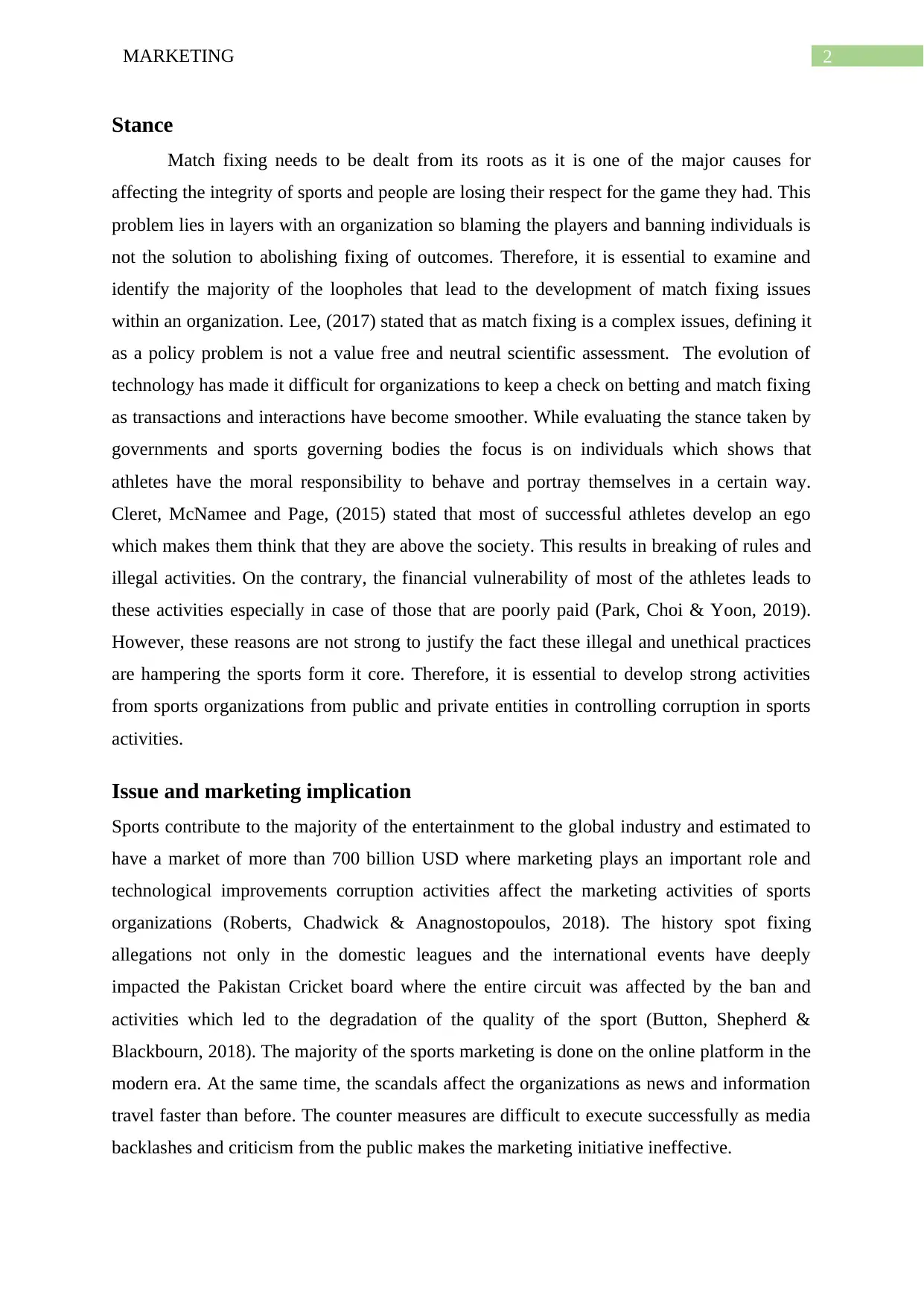
2MARKETING
Stance
Match fixing needs to be dealt from its roots as it is one of the major causes for
affecting the integrity of sports and people are losing their respect for the game they had. This
problem lies in layers with an organization so blaming the players and banning individuals is
not the solution to abolishing fixing of outcomes. Therefore, it is essential to examine and
identify the majority of the loopholes that lead to the development of match fixing issues
within an organization. Lee, (2017) stated that as match fixing is a complex issues, defining it
as a policy problem is not a value free and neutral scientific assessment. The evolution of
technology has made it difficult for organizations to keep a check on betting and match fixing
as transactions and interactions have become smoother. While evaluating the stance taken by
governments and sports governing bodies the focus is on individuals which shows that
athletes have the moral responsibility to behave and portray themselves in a certain way.
Cleret, McNamee and Page, (2015) stated that most of successful athletes develop an ego
which makes them think that they are above the society. This results in breaking of rules and
illegal activities. On the contrary, the financial vulnerability of most of the athletes leads to
these activities especially in case of those that are poorly paid (Park, Choi & Yoon, 2019).
However, these reasons are not strong to justify the fact these illegal and unethical practices
are hampering the sports form it core. Therefore, it is essential to develop strong activities
from sports organizations from public and private entities in controlling corruption in sports
activities.
Issue and marketing implication
Sports contribute to the majority of the entertainment to the global industry and estimated to
have a market of more than 700 billion USD where marketing plays an important role and
technological improvements corruption activities affect the marketing activities of sports
organizations (Roberts, Chadwick & Anagnostopoulos, 2018). The history spot fixing
allegations not only in the domestic leagues and the international events have deeply
impacted the Pakistan Cricket board where the entire circuit was affected by the ban and
activities which led to the degradation of the quality of the sport (Button, Shepherd &
Blackbourn, 2018). The majority of the sports marketing is done on the online platform in the
modern era. At the same time, the scandals affect the organizations as news and information
travel faster than before. The counter measures are difficult to execute successfully as media
backlashes and criticism from the public makes the marketing initiative ineffective.
Stance
Match fixing needs to be dealt from its roots as it is one of the major causes for
affecting the integrity of sports and people are losing their respect for the game they had. This
problem lies in layers with an organization so blaming the players and banning individuals is
not the solution to abolishing fixing of outcomes. Therefore, it is essential to examine and
identify the majority of the loopholes that lead to the development of match fixing issues
within an organization. Lee, (2017) stated that as match fixing is a complex issues, defining it
as a policy problem is not a value free and neutral scientific assessment. The evolution of
technology has made it difficult for organizations to keep a check on betting and match fixing
as transactions and interactions have become smoother. While evaluating the stance taken by
governments and sports governing bodies the focus is on individuals which shows that
athletes have the moral responsibility to behave and portray themselves in a certain way.
Cleret, McNamee and Page, (2015) stated that most of successful athletes develop an ego
which makes them think that they are above the society. This results in breaking of rules and
illegal activities. On the contrary, the financial vulnerability of most of the athletes leads to
these activities especially in case of those that are poorly paid (Park, Choi & Yoon, 2019).
However, these reasons are not strong to justify the fact these illegal and unethical practices
are hampering the sports form it core. Therefore, it is essential to develop strong activities
from sports organizations from public and private entities in controlling corruption in sports
activities.
Issue and marketing implication
Sports contribute to the majority of the entertainment to the global industry and estimated to
have a market of more than 700 billion USD where marketing plays an important role and
technological improvements corruption activities affect the marketing activities of sports
organizations (Roberts, Chadwick & Anagnostopoulos, 2018). The history spot fixing
allegations not only in the domestic leagues and the international events have deeply
impacted the Pakistan Cricket board where the entire circuit was affected by the ban and
activities which led to the degradation of the quality of the sport (Button, Shepherd &
Blackbourn, 2018). The majority of the sports marketing is done on the online platform in the
modern era. At the same time, the scandals affect the organizations as news and information
travel faster than before. The counter measures are difficult to execute successfully as media
backlashes and criticism from the public makes the marketing initiative ineffective.
⊘ This is a preview!⊘
Do you want full access?
Subscribe today to unlock all pages.

Trusted by 1+ million students worldwide
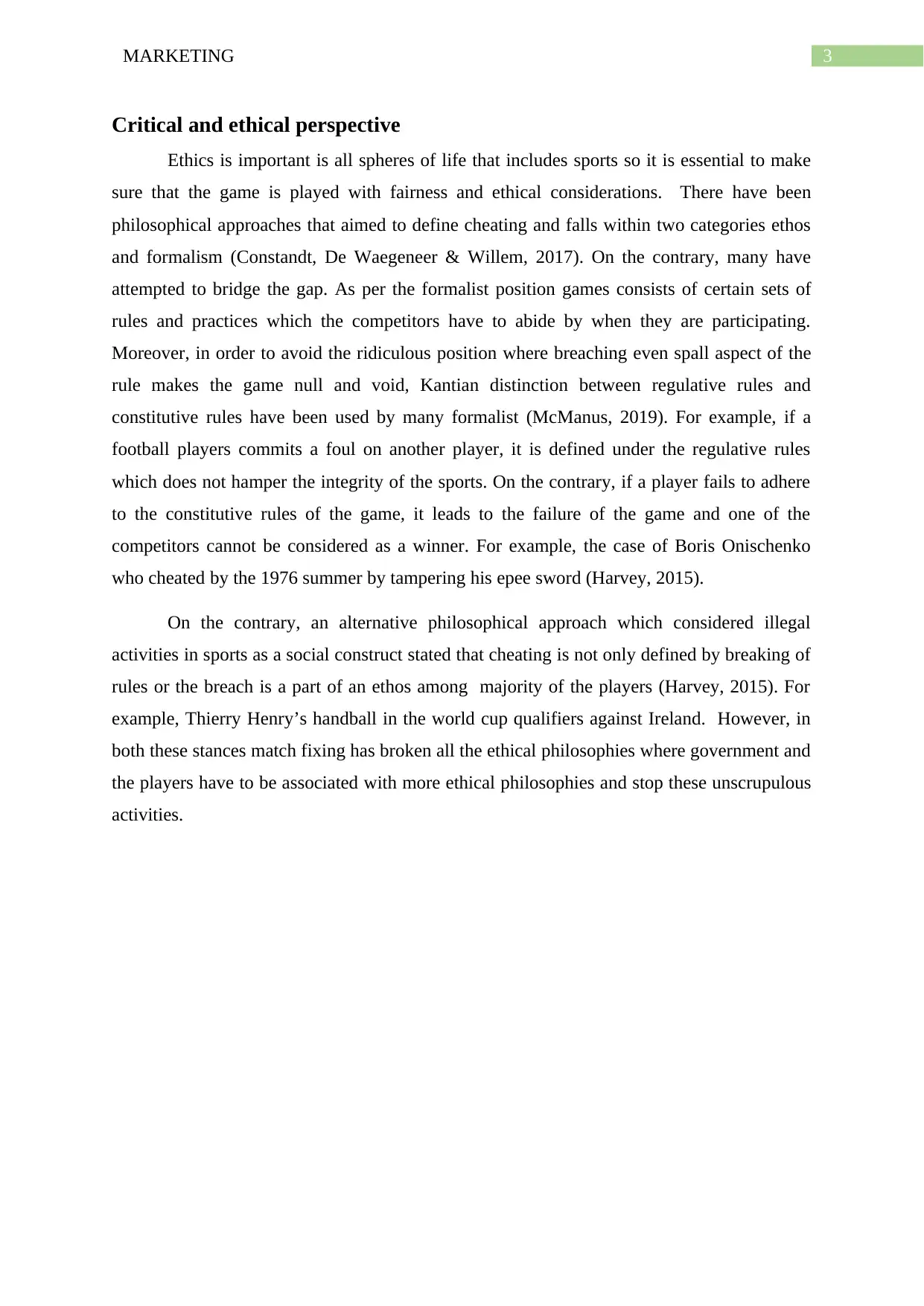
3MARKETING
Critical and ethical perspective
Ethics is important is all spheres of life that includes sports so it is essential to make
sure that the game is played with fairness and ethical considerations. There have been
philosophical approaches that aimed to define cheating and falls within two categories ethos
and formalism (Constandt, De Waegeneer & Willem, 2017). On the contrary, many have
attempted to bridge the gap. As per the formalist position games consists of certain sets of
rules and practices which the competitors have to abide by when they are participating.
Moreover, in order to avoid the ridiculous position where breaching even spall aspect of the
rule makes the game null and void, Kantian distinction between regulative rules and
constitutive rules have been used by many formalist (McManus, 2019). For example, if a
football players commits a foul on another player, it is defined under the regulative rules
which does not hamper the integrity of the sports. On the contrary, if a player fails to adhere
to the constitutive rules of the game, it leads to the failure of the game and one of the
competitors cannot be considered as a winner. For example, the case of Boris Onischenko
who cheated by the 1976 summer by tampering his epee sword (Harvey, 2015).
On the contrary, an alternative philosophical approach which considered illegal
activities in sports as a social construct stated that cheating is not only defined by breaking of
rules or the breach is a part of an ethos among majority of the players (Harvey, 2015). For
example, Thierry Henry’s handball in the world cup qualifiers against Ireland. However, in
both these stances match fixing has broken all the ethical philosophies where government and
the players have to be associated with more ethical philosophies and stop these unscrupulous
activities.
Critical and ethical perspective
Ethics is important is all spheres of life that includes sports so it is essential to make
sure that the game is played with fairness and ethical considerations. There have been
philosophical approaches that aimed to define cheating and falls within two categories ethos
and formalism (Constandt, De Waegeneer & Willem, 2017). On the contrary, many have
attempted to bridge the gap. As per the formalist position games consists of certain sets of
rules and practices which the competitors have to abide by when they are participating.
Moreover, in order to avoid the ridiculous position where breaching even spall aspect of the
rule makes the game null and void, Kantian distinction between regulative rules and
constitutive rules have been used by many formalist (McManus, 2019). For example, if a
football players commits a foul on another player, it is defined under the regulative rules
which does not hamper the integrity of the sports. On the contrary, if a player fails to adhere
to the constitutive rules of the game, it leads to the failure of the game and one of the
competitors cannot be considered as a winner. For example, the case of Boris Onischenko
who cheated by the 1976 summer by tampering his epee sword (Harvey, 2015).
On the contrary, an alternative philosophical approach which considered illegal
activities in sports as a social construct stated that cheating is not only defined by breaking of
rules or the breach is a part of an ethos among majority of the players (Harvey, 2015). For
example, Thierry Henry’s handball in the world cup qualifiers against Ireland. However, in
both these stances match fixing has broken all the ethical philosophies where government and
the players have to be associated with more ethical philosophies and stop these unscrupulous
activities.
Paraphrase This Document
Need a fresh take? Get an instant paraphrase of this document with our AI Paraphraser
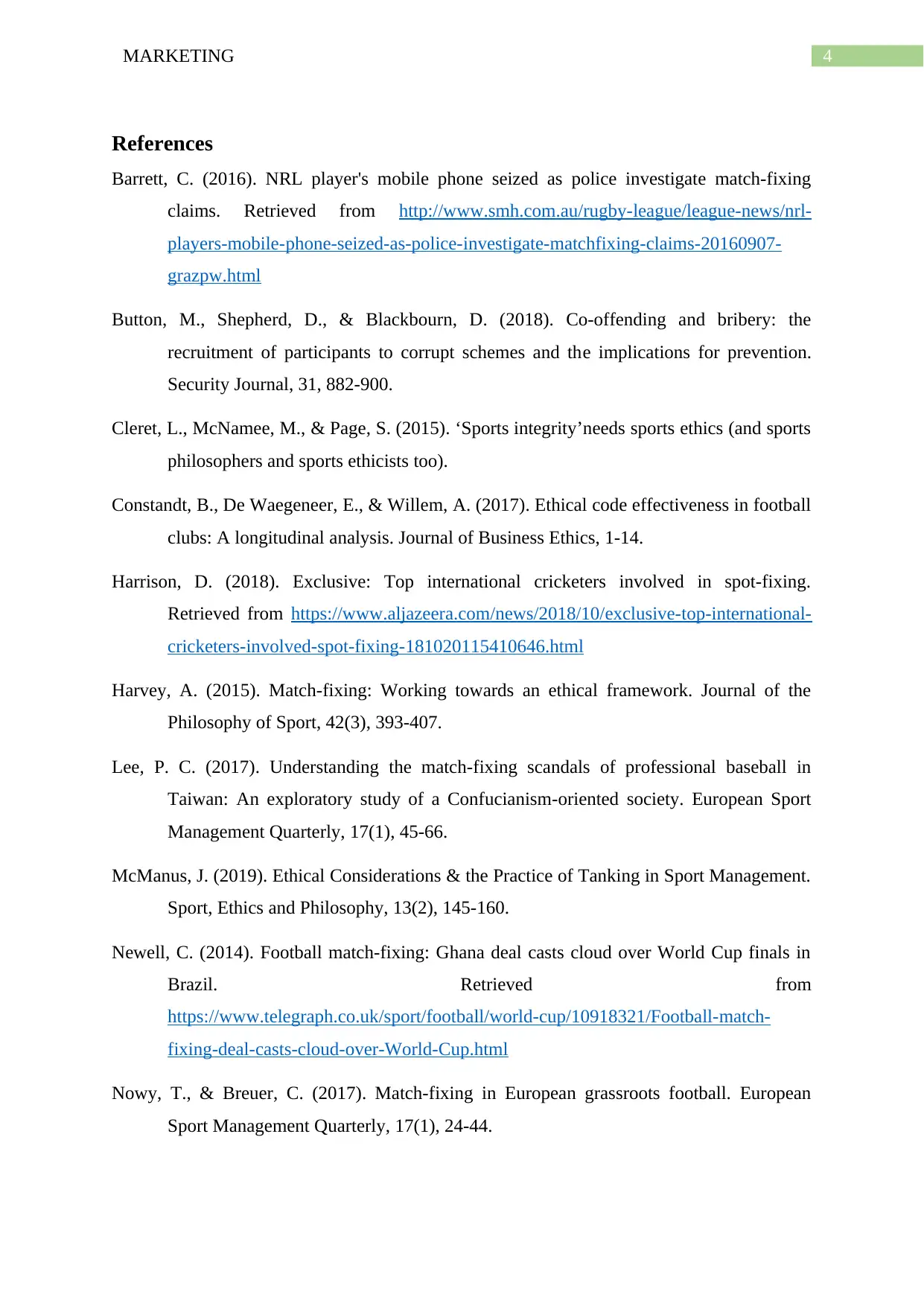
4MARKETING
References
Barrett, C. (2016). NRL player's mobile phone seized as police investigate match-fixing
claims. Retrieved from http://www.smh.com.au/rugby-league/league-news/nrl-
players-mobile-phone-seized-as-police-investigate-matchfixing-claims-20160907-
grazpw.html
Button, M., Shepherd, D., & Blackbourn, D. (2018). Co-offending and bribery: the
recruitment of participants to corrupt schemes and the implications for prevention.
Security Journal, 31, 882-900.
Cleret, L., McNamee, M., & Page, S. (2015). ‘Sports integrity’needs sports ethics (and sports
philosophers and sports ethicists too).
Constandt, B., De Waegeneer, E., & Willem, A. (2017). Ethical code effectiveness in football
clubs: A longitudinal analysis. Journal of Business Ethics, 1-14.
Harrison, D. (2018). Exclusive: Top international cricketers involved in spot-fixing.
Retrieved from https://www.aljazeera.com/news/2018/10/exclusive-top-international-
cricketers-involved-spot-fixing-181020115410646.html
Harvey, A. (2015). Match-fixing: Working towards an ethical framework. Journal of the
Philosophy of Sport, 42(3), 393-407.
Lee, P. C. (2017). Understanding the match-fixing scandals of professional baseball in
Taiwan: An exploratory study of a Confucianism-oriented society. European Sport
Management Quarterly, 17(1), 45-66.
McManus, J. (2019). Ethical Considerations & the Practice of Tanking in Sport Management.
Sport, Ethics and Philosophy, 13(2), 145-160.
Newell, C. (2014). Football match-fixing: Ghana deal casts cloud over World Cup finals in
Brazil. Retrieved from
https://www.telegraph.co.uk/sport/football/world-cup/10918321/Football-match-
fixing-deal-casts-cloud-over-World-Cup.html
Nowy, T., & Breuer, C. (2017). Match-fixing in European grassroots football. European
Sport Management Quarterly, 17(1), 24-44.
References
Barrett, C. (2016). NRL player's mobile phone seized as police investigate match-fixing
claims. Retrieved from http://www.smh.com.au/rugby-league/league-news/nrl-
players-mobile-phone-seized-as-police-investigate-matchfixing-claims-20160907-
grazpw.html
Button, M., Shepherd, D., & Blackbourn, D. (2018). Co-offending and bribery: the
recruitment of participants to corrupt schemes and the implications for prevention.
Security Journal, 31, 882-900.
Cleret, L., McNamee, M., & Page, S. (2015). ‘Sports integrity’needs sports ethics (and sports
philosophers and sports ethicists too).
Constandt, B., De Waegeneer, E., & Willem, A. (2017). Ethical code effectiveness in football
clubs: A longitudinal analysis. Journal of Business Ethics, 1-14.
Harrison, D. (2018). Exclusive: Top international cricketers involved in spot-fixing.
Retrieved from https://www.aljazeera.com/news/2018/10/exclusive-top-international-
cricketers-involved-spot-fixing-181020115410646.html
Harvey, A. (2015). Match-fixing: Working towards an ethical framework. Journal of the
Philosophy of Sport, 42(3), 393-407.
Lee, P. C. (2017). Understanding the match-fixing scandals of professional baseball in
Taiwan: An exploratory study of a Confucianism-oriented society. European Sport
Management Quarterly, 17(1), 45-66.
McManus, J. (2019). Ethical Considerations & the Practice of Tanking in Sport Management.
Sport, Ethics and Philosophy, 13(2), 145-160.
Newell, C. (2014). Football match-fixing: Ghana deal casts cloud over World Cup finals in
Brazil. Retrieved from
https://www.telegraph.co.uk/sport/football/world-cup/10918321/Football-match-
fixing-deal-casts-cloud-over-World-Cup.html
Nowy, T., & Breuer, C. (2017). Match-fixing in European grassroots football. European
Sport Management Quarterly, 17(1), 24-44.
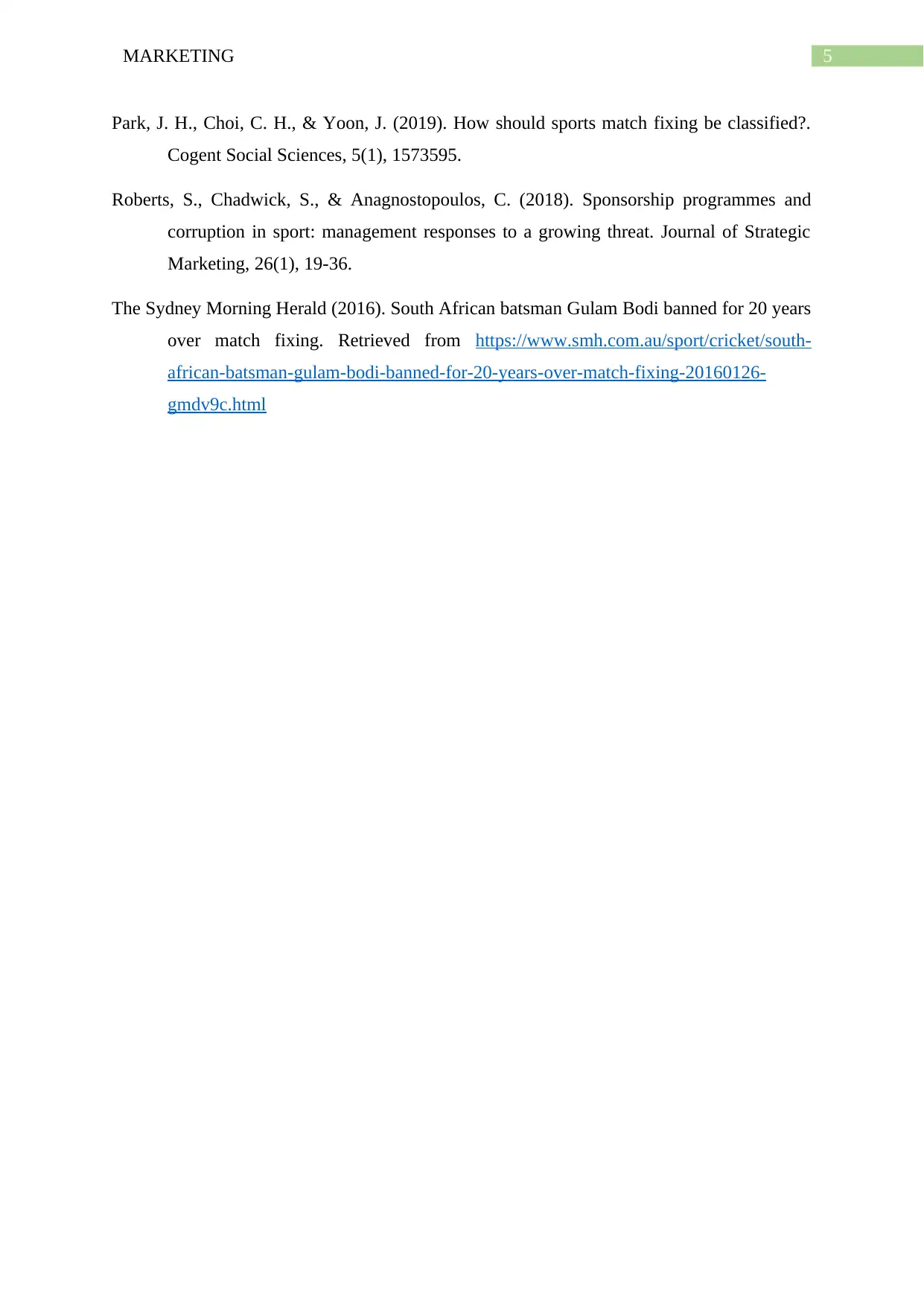
5MARKETING
Park, J. H., Choi, C. H., & Yoon, J. (2019). How should sports match fixing be classified?.
Cogent Social Sciences, 5(1), 1573595.
Roberts, S., Chadwick, S., & Anagnostopoulos, C. (2018). Sponsorship programmes and
corruption in sport: management responses to a growing threat. Journal of Strategic
Marketing, 26(1), 19-36.
The Sydney Morning Herald (2016). South African batsman Gulam Bodi banned for 20 years
over match fixing. Retrieved from https://www.smh.com.au/sport/cricket/south-
african-batsman-gulam-bodi-banned-for-20-years-over-match-fixing-20160126-
gmdv9c.html
Park, J. H., Choi, C. H., & Yoon, J. (2019). How should sports match fixing be classified?.
Cogent Social Sciences, 5(1), 1573595.
Roberts, S., Chadwick, S., & Anagnostopoulos, C. (2018). Sponsorship programmes and
corruption in sport: management responses to a growing threat. Journal of Strategic
Marketing, 26(1), 19-36.
The Sydney Morning Herald (2016). South African batsman Gulam Bodi banned for 20 years
over match fixing. Retrieved from https://www.smh.com.au/sport/cricket/south-
african-batsman-gulam-bodi-banned-for-20-years-over-match-fixing-20160126-
gmdv9c.html
⊘ This is a preview!⊘
Do you want full access?
Subscribe today to unlock all pages.

Trusted by 1+ million students worldwide
1 out of 6
Your All-in-One AI-Powered Toolkit for Academic Success.
+13062052269
info@desklib.com
Available 24*7 on WhatsApp / Email
![[object Object]](/_next/static/media/star-bottom.7253800d.svg)
Unlock your academic potential
Copyright © 2020–2026 A2Z Services. All Rights Reserved. Developed and managed by ZUCOL.


